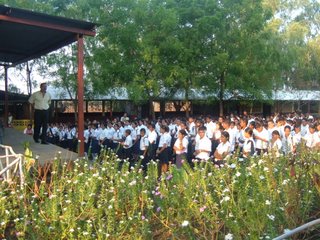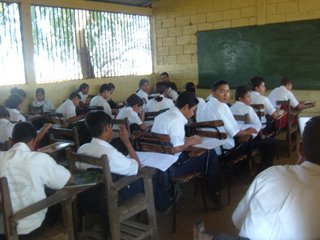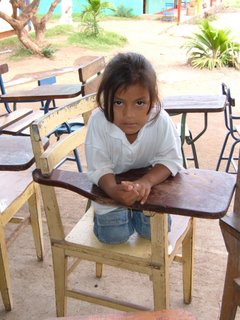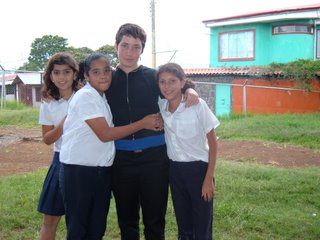Every morning the students that attend Alberto Berrios Delgadillo in Chacraseca, Nicaragua and their teachers get up early to catch the bus to school, some coming all the way from the nearby city of Leon--particularly the teachers. The bus is not exclusively for students, but serves the entire community. Teachers and primarily female students cram inside of the bus,--teachers given preference to the bench seats along the sides while everyone else stands in the aisle-- while some male student pay a cheaper fee to ride on the roof. On the inside of the bus passengers hold handkerchiefs over their noses and mouths to avoid inhaling the dust that enters through the bus' windows.
The students that live in the opposite direction from school that the bus comes or that cannot afford to ride, arrive at school on bikes or walking. Usually two students ride one bike, with one pedalling and the other riding behind on the seat. During the day students leave their bikes parked in the courtyard, and then return home on them when school ends midday.
 Once all of the students have arrived at school they line up by class to hear the daily announcements, sing the national anthem and pray. As you can see, students wear uniforms; boys wear blue slacks and white dress shirts and girls wear blue skirts and white dress shirts. (The same uniform is worn throughout Nicaragua.)
Once all of the students have arrived at school they line up by class to hear the daily announcements, sing the national anthem and pray. As you can see, students wear uniforms; boys wear blue slacks and white dress shirts and girls wear blue skirts and white dress shirts. (The same uniform is worn throughout Nicaragua.) Students then go to their respective classrooms where they sit in desks made in the community, often by the very students that attend the school. Unlike most high schools in the States, students at Alberto Berrios stay in the same classroom all day and teachers move from class to class. Students receive instruction in Spanish (literature, writing, grammar), Math, Science, Social Studies, Computer Science, English (language) and PE. There are no electives. Each student typically has a spiral notebook and writing utensils. There are no textbooks. The only resource that the teacher has is the chalkboard, and students diligently copy down what is written. There is a short break in the middle of the morning so that the students can get a snack at the school canteen and hang out with their friends. The school day ends at noon or when the bus arrives to take students back to their homes.
Students then go to their respective classrooms where they sit in desks made in the community, often by the very students that attend the school. Unlike most high schools in the States, students at Alberto Berrios stay in the same classroom all day and teachers move from class to class. Students receive instruction in Spanish (literature, writing, grammar), Math, Science, Social Studies, Computer Science, English (language) and PE. There are no electives. Each student typically has a spiral notebook and writing utensils. There are no textbooks. The only resource that the teacher has is the chalkboard, and students diligently copy down what is written. There is a short break in the middle of the morning so that the students can get a snack at the school canteen and hang out with their friends. The school day ends at noon or when the bus arrives to take students back to their homes.  Students often stay after school when the library is open to work on projects, as it is their only means of getting access to books. The library stock is very limited, consisting mostly of teacher textbooks, encyclopedias, dictionaries and maps. There is no Internet access at school and though students can travel to Leon to use the Internet, most cannot afford the trip and the price of access in the cities cyber cafes, which are primarily used by tourists.
Students often stay after school when the library is open to work on projects, as it is their only means of getting access to books. The library stock is very limited, consisting mostly of teacher textbooks, encyclopedias, dictionaries and maps. There is no Internet access at school and though students can travel to Leon to use the Internet, most cannot afford the trip and the price of access in the cities cyber cafes, which are primarily used by tourists.How do these students' educational experiences compare to yours? What is the same? What is different?
For more information about education in Nicaragua check out the following sites:



